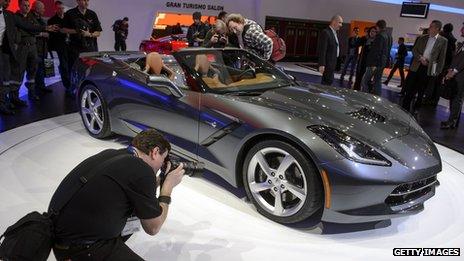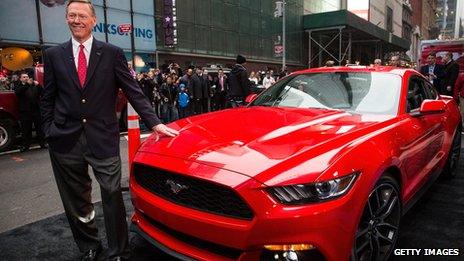General Motors to withdraw Chevrolet brand from Europe
- Published

General Motors will continue to sell "iconic" marques, such as Chevrolet Corvette Stingray
General Motors, the US car giant, has said it plans to withdraw its Chevrolet brand from Europe and concentrate more on its Opel and Vauxhall brands.
The withdrawal will begin from 2016, the company said.
Chevrolet would no longer have a "mainstream presence" in the region, largely thanks to "the difficult economic situation", GM said.
But "iconic vehicles", such as the Corvette, would continue to be sold and it would retain a presence in Russia.
In 2012, Chevrolet sold 195,000 cars and SUVs (sport utility vehicles) in western and central Europe, followed by a further 137,000 in the first 10 months of 2013.
But it has been losing money in the region, where a mature and saturated car market, coupled with a fragile economy, has stifled growth.
GM chief executive Dan Akerson said the decision would "allow us to focus our investments where the opportunity for growth is greatest".
This meant focusing on Opel and Vauxhall and expanding its Cadillac brand in Europe, he said.
"Europe is a key region for GM," he added.
Most of the Chevrolet models sold in Europe are produced in South Korea.
GM said it would focus on profitability, cost management and maximising sales throughout its Korean operations.
Buoyant UK market
While the car market in continental Europe may be stagnating, the picture in the UK seems markedly different.
New car registrations rose 7% in November to 159,581 units, the month's best performance since 2004, the Society of Motor Manufacturers and Traders (SMMT) reported.
More than 2.1 million cars have been registered in the year-to-date, up 9.9% and already ahead of 2012's full-year figure.
The SMMT is forecasting 2.25 million registrations for 2013.
Chief executive Mike Hawkes said the figures represented "a tremendous success for the industry".
Ford's global ambitions

Ford boss Alan Mulally unveiled the company's new Mustang at an event in New York
Meanwhile, GM's competitor, Ford, unveiled its latest Mustang sports car.
Mustangs have not been officially available to overseas buyers since 1979. But in a departure from tradition, Ford said it was a "world car" that would be made available in Europe and China.
The car, which celebrates its 50th anniversary next year, is what is known as a "halo car" - meant to lure car buyers to the Ford brand if not to a Mustang in particular.
Although other iconic US sports cars, like GM's Corvette, have not found much success overseas, analysts are optimistic that the Mustang could appeal to Chinese buyers in particular.
"The Chinese have a good feeling about American vehicles and Ford's doing extremely well in China," Edmunds.com senior analyst Michele Krebs told the BBC.